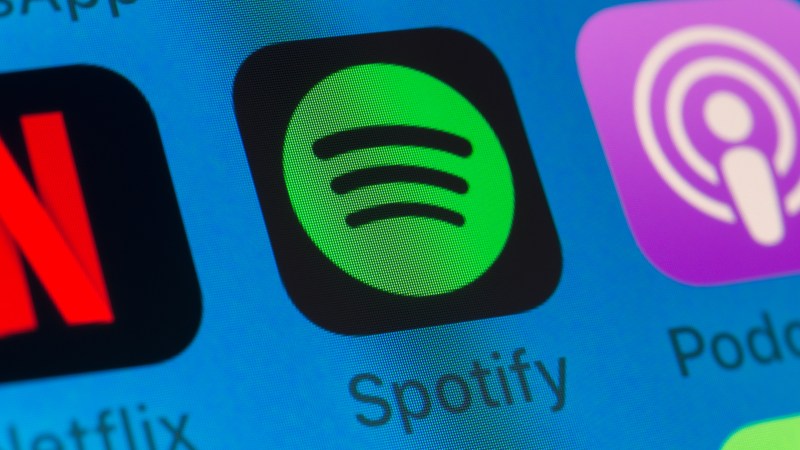Spotify declares victory over Apple in App Store controls fight
Spotify has declared a victory over Apple in Europe by changing its iPhone app to include previously banned in-app sales and promotions of its own services.
Taking its cue from a new law that aims to break the dominance of Big Tech, from March the new iPhone version of the Swedish streaming service in Europe will display offers and pricing to its members and will allow customers to make purchases, for example of new subscriptions, via the app. Customers elsewhere will see the old version.
It is the first example of a leading technology company making a change to how it does business in response to the European Union’s Digital Markets Act. A similar bill is going through the House of Lords and Spotify hopes it will lead to these changes being made for consumers in Britain.
Apple previously had not allowed Spotify to advertise in-app promotions or discounts. It was a longstanding source of friction between the two companies, with Spotify arguing that it was unfair, especially because Apple is a fierce competitor in music streaming.
Daniel Ek, Spotify’s founder, said recently that Apple was drowning out its competition by including a 30 per cent fee on in-app sales for companies with apps on the store: “They won’t charge 30 per cent [the App Store fee] to their own music service, so they should allow us not to pay 30 per cent so we can compete on a level playing field,” the Swedish entrepreneur, 40, said.
The changes will mean that customers in Europe now will be able to buy audiobooks or to upgrade their subscriptions by making a few clicks from within the Spotify app, rather than logging in via a web browser.
“For the first time, you will be able to see the price of an audiobook when browsing, easily buy it and quickly start listening,” Spotify said in a statement. “For years, even in our own app, Apple had these rules where we couldn’t tell you about offers, how much something costs or even where or how to buy it. We know, pretty nuts. The Digital Markets Act means that we’ll finally be able to share details about deals, promotions and better-value payment options in the EU.”
Avery Gardiner, Spotify’s lawyer, said that so far Apple had not pushed back on the changes. “I think it’s very clear that the Digital Markets Act says we can do these things,” she said.
Spotify and Apple have clashed many times over the years about the commercial terms of the iPhone company’s app store. In 2019, Spotify filed a competition complaint against Apple in Europe, alleging that the American group had abused its App Store dominance to give preferential treatment to Apple Music. In response, Apple argued that Spotify owed its success to Apple’s ecosystem. It prompted a European Commission investigation and a final ruling is expected to be delivered soon. The commission’s preliminary view, published last year, stated that Apple had abused its dominant position. If it is found guilty, the company could face a fine of up to 10 per cent of its annual sales.
Spotify is not the only company to object to the terms on Apple’s app store. Epic Games took the company to court over in-app transaction fees after it tried to introduce direct payments into its Fortnite game. It lost the dispute in the Supreme Court this month.
Gardiner would not say what the revenue implications would be of the changes for Spotify, only that “there will be opportunities for customers to benefit and from developers like Spotify to benefit”.
Alex Haffner, competition partner at Fladgate, the City law firm, said: “This is quite a bolshie move from Spotify, to say the least. It is pushing the envelope somewhat for them to claim that Apple’s 30 per cent developer fee structure will no longer prevail post-implementation of the Digital Markets Act, given, in particular, that Apple is in the middle of a legal challenge to any designation of its App Store as a “gatekeeper” subject to the provisions of the new legislation. Further, Apple has confirmed that it expects to have to make changes to its App Store policies, including the charging structure, but has not yet gone public on those.“What the statement shows, however, is that Spotify feels emboldened by the regulator headwinds facing Apple, and certain court cases that seem to have gone in favour of developers, to go on the offensive and effectively mark Apple’s card that absent significant changes to its App Store charging structure, Spotify and others will be going straight to the regulators to demand further action.”
Spotify is the world’s biggest music streaming business with 574 million monthly active users. While there are no official figures for Apple Music, analysts at JP Morgan estimate that it will hit 110 million subscribers by 2025.
Apple did not respond to a request for comment.
Shares in Spotify closed on $211.18, up $4.47, or 2.2 per cent in New York, while Apple ended the session down by 68 cents, or 0.4 per cent, at $194.50.






